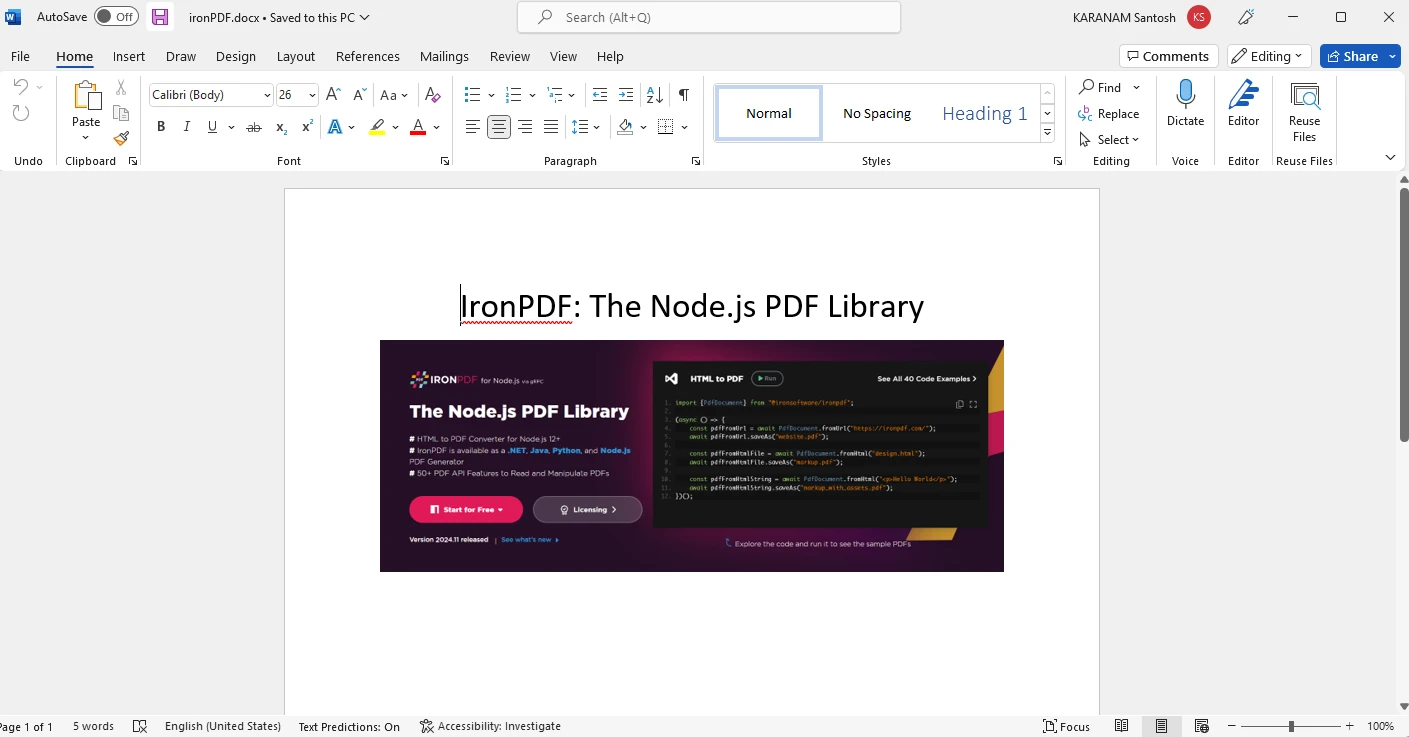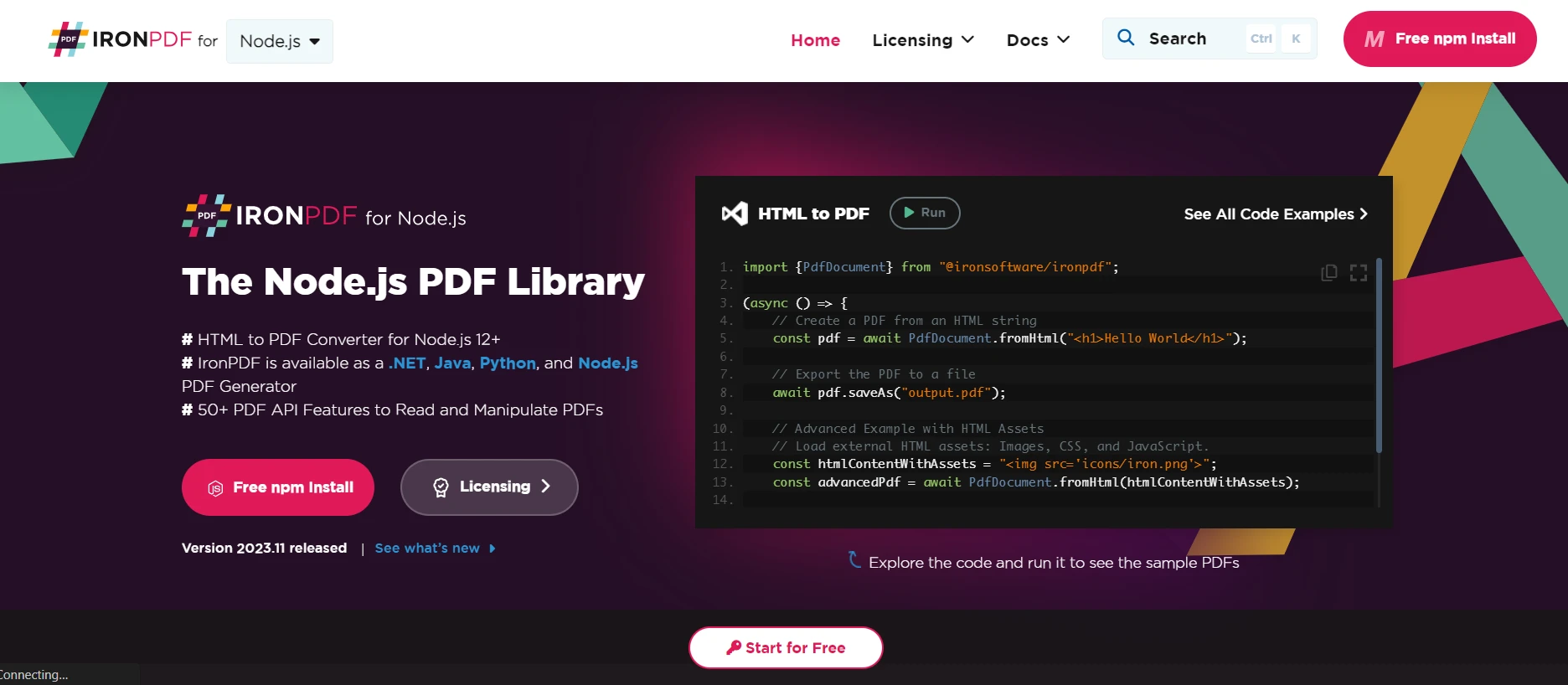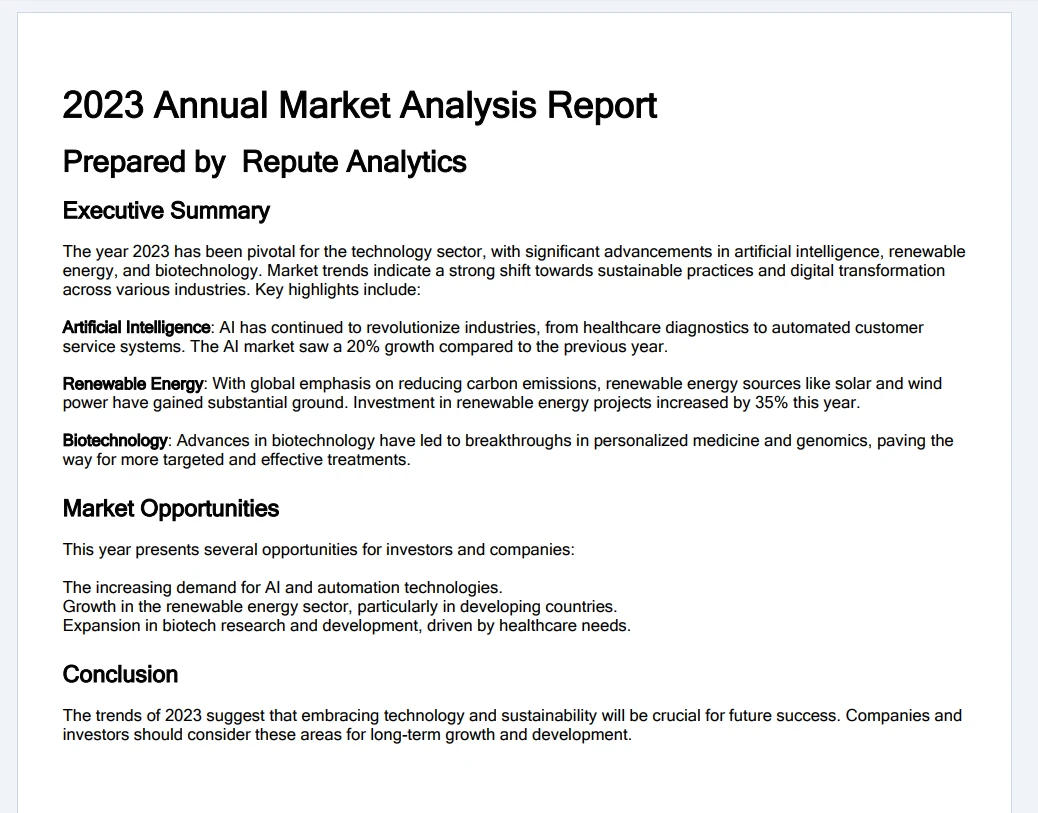How to Download PDF Files From URL in Node.js
This article will explore the process of downloading PDF documents from URLs using the PDF library known as IronPDF, tailored specifically for Node.js. This library provides a robust solution for handling PDF-related server-side tasks in Node.js applications, streamlining the retrieval and manipulation of PDF documents from remote sources.
IronPDF for Node.js
IronPDF for Node.js is a versatile and powerful PDF library designed to facilitate seamless PDF generation, manipulation, and management within Node.js applications. It offers developers a comprehensive set of features and functionalities to work with PDF documents, making it an indispensable tool for a wide array of web development projects.
Developed specifically for integration with Node.js, IronPDF empowers developers to effortlessly generate PDF files from various data sources, such as HTML, CSS, and images. This allows for dynamic content creation, making it ideal for generating invoices, reports, certificates, or any other documents that require a professional and standardized format.
One of the standout features of IronPDF is its ability to convert HTML content directly to PDF, enabling developers to take advantage of their existing web development skills and libraries. This means you can leverage your proficiency in HTML and CSS to craft visually appealing PDFs without the need for complex manual formatting. Additionally, IronPDF provides functionalities to merge, split, and manipulate existing PDF files, allowing for advanced document organization and customization. It also supports encryption and password protection, enhancing the security of sensitive information within PDFs.
IronPDF Features
- PDF Generation: Create PDFs effortlessly using HTML, CSS, and images. Tailor content for professional-grade PDFs.
- HTML to PDF: Convert complex HTML into polished PDFs while maintaining formatting and styling.
- PDF Editing: Modify and edit existing PDFs to update, correct, or add elements as needed.
- Merging and Splitting: Combine or separate PDF files for efficient organization and structuring.
- Printing: Print PDFs directly from Node.js for convenient physical copies.
- Form Handling: Efficiently fill and extract data from PDF forms to enhance user interaction.
- Security: Implement encryption and password protection for PDF document security.
- Text Extraction: Extract text from PDFs for easy content access and data retrieval.
- Customization: Control PDF layout and styles to achieve a professional and polished look.
- Cross-Platform: Seamlessly operate on various platforms for consistent performance and functionality.
Installing IronPDF for Node.js
This section will discuss how you can set up the environment and install IronPDF for Node.js.
Before starting, make sure you have Node.js installed on your system.
- First, open the Command Prompt (CMD) and create a new Node.js project using the following commands.
mkdir IronPDFThis will create a new directory to set up this demo project. Create a new folder for the demo project
Create a new folder for the demo projectcd IronPDFThis command will navigate to the newly created directory.npm init -yThis command will create a package.json file, which will store project-related metadata and dependencies.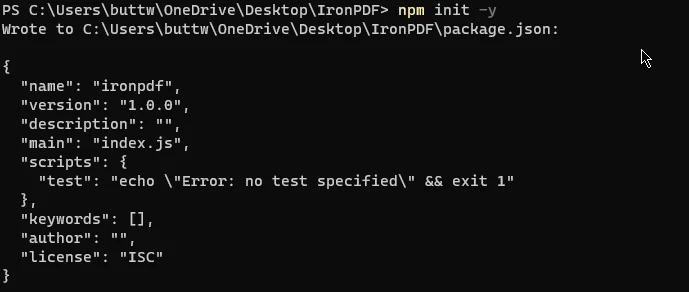 Init a Node.js project
Init a Node.js projectOnce the initial setup is completed, let's install IronPDF using the following command.
npm install @ironsoftware/ironpdfnpm install @ironsoftware/ironpdfSHELLNow open the project in Visual Studio Code and create a new file named "index.js".
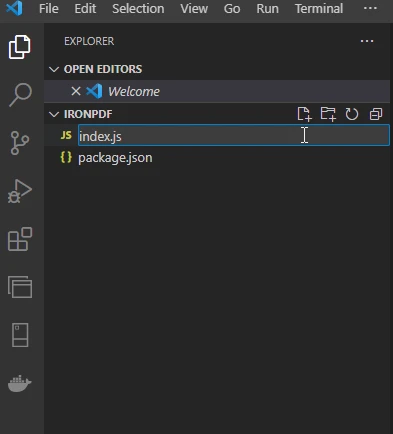 Create an index.js file to start the project
Create an index.js file to start the projectNow open the package.json file and add the following line to specify the module type.
"type": "module",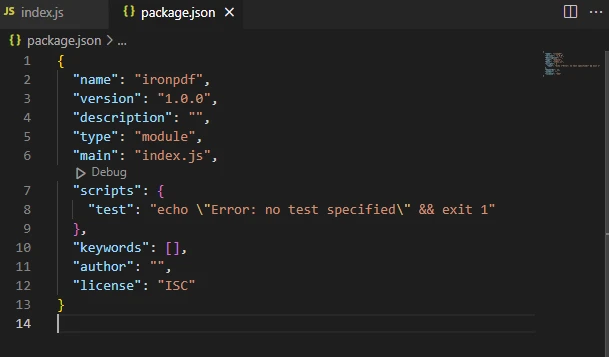 Screenshot of package.json file
Screenshot of package.json file
Just like that, IronPDF is installed, and the environment is ready for running the IronPDF code.
Download PDF Files from URL Using IronPDF for Node.js
IronPDF for Node.js provides a powerful feature allowing the rendering of PDFs directly from URLs and subsequently saving them in the local file system. Essentially, it operates as a comprehensive PDF downloader, offering the capabilities of a full-version PDF downloader.
The following code can create and save PDF files from a URL using IronPDF for Node.js.
import { PdfDocument } from "@ironsoftware/ironpdf";
// Asynchronously render and save a PDF from a URL
(async () => {
try {
// Define the URL of the web page to be rendered as a PDF
const url = "https://ironpdf.com/";
// Render the web URL to a PDF document
const pdf = await PdfDocument.fromUrl(url);
// Save the PDF document to a file
await pdf.saveAs("pdf-from-url.pdf");
console.log("PDF successfully downloaded and saved as 'pdf-from-url.pdf'");
} catch (error) {
console.error("An error occurred while downloading the PDF:", error);
}
})();import { PdfDocument } from "@ironsoftware/ironpdf";
// Asynchronously render and save a PDF from a URL
(async () => {
try {
// Define the URL of the web page to be rendered as a PDF
const url = "https://ironpdf.com/";
// Render the web URL to a PDF document
const pdf = await PdfDocument.fromUrl(url);
// Save the PDF document to a file
await pdf.saveAs("pdf-from-url.pdf");
console.log("PDF successfully downloaded and saved as 'pdf-from-url.pdf'");
} catch (error) {
console.error("An error occurred while downloading the PDF:", error);
}
})();The provided code is a JavaScript program that utilizes the IronPDF for Node.js library to generate a PDF from a specified URL and save it as a PDF file. Let's break down the code step-by-step:
Importing the
PdfDocumentclass from IronPDF:import { PdfDocument } from "@ironsoftware/ironpdf";import { PdfDocument } from "@ironsoftware/ironpdf";JAVASCRIPTThis line imports the
PdfDocumentclass from the IronPDF library, which is used to work with PDF documents.Using an asynchronous
IIFE(Immediately Invoked Function Expression):(async () => { /* Code here */ })();(async () => { /* Code here */ })();JAVASCRIPTThis structure defines an immediately invoked function expression that is marked as
async, allowing the use ofawaitwithin the function. It invokes itself immediately after declaration.Rendering a web URL to PDF:
const pdf = await PdfDocument.fromUrl("https://ironpdf.com/");const pdf = await PdfDocument.fromUrl("https://ironpdf.com/");JAVASCRIPTThis line uses the
fromUrlstatic method of thePdfDocumentclass to render a web page URL (in this case, "https://ironpdf.com/") as a PDF document.Exporting the PDF document:
await pdf.saveAs("pdf-from-url.pdf");await pdf.saveAs("pdf-from-url.pdf");JAVASCRIPTThis line uses the
saveAsmethod of the PDF document to save the generated PDF to a file named "pdf-from-url.pdf". Theawaitkeyword is used to wait for the save operation to complete.
Overall, this script uses IronPDF to fetch a web URL, render it as a PDF document, and save the downloaded PDF file as a local file with the specified filename "pdf-from-url.pdf". The use of async/await allows for handling the asynchronous nature of PDF generation and file saving.
Output PDF file
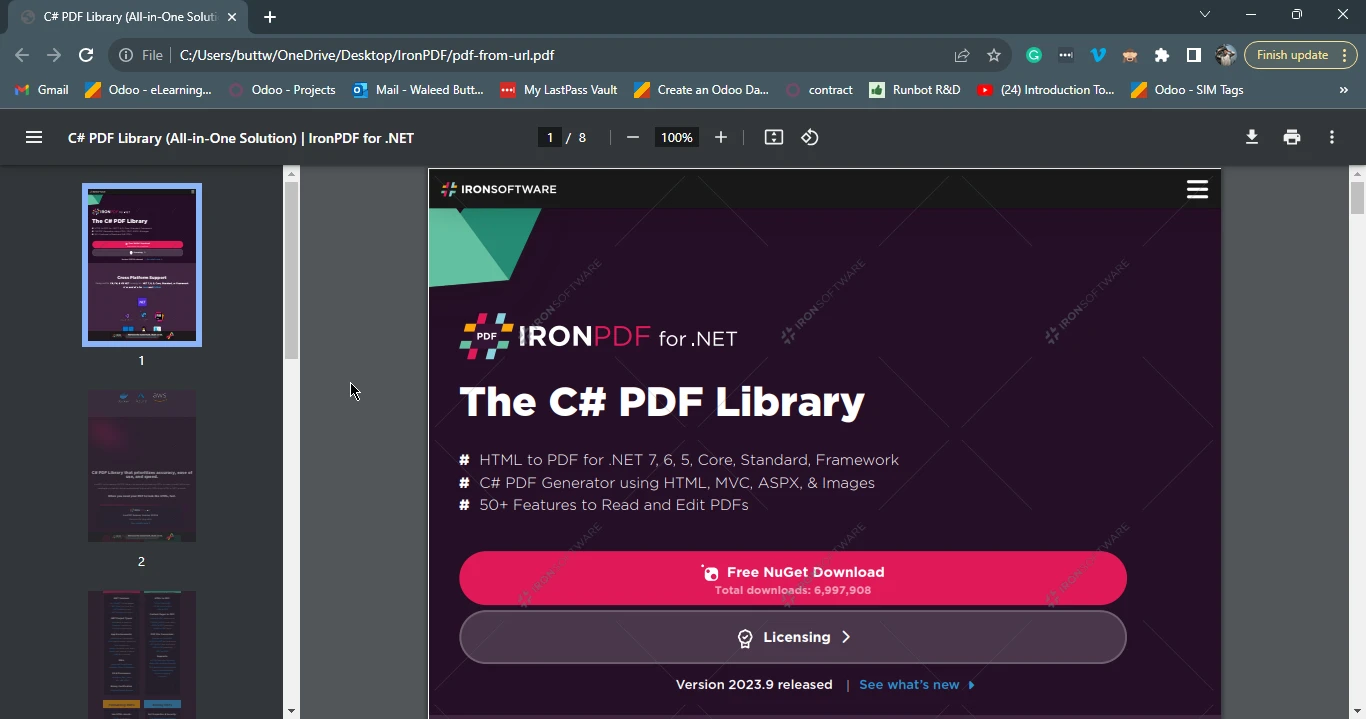 The Output PDF File
The Output PDF File
Conclusion
Node.js, with its robust runtime environment for server-side JavaScript, proves to be an ideal choice for a variety of web development tasks. Specifically, the need to download PDF files from designated URLs is a common requirement, and Node.js, when combined with specialized libraries like IronPDF, offers a seamless solution. IronPDF for Node.js empowers developers to effortlessly generate, manipulate, and manage PDF documents, enhancing the integration of critical resources for efficient access in various applications and processes.
By leveraging the features of IronPDF, such as HTML to PDF conversion, PDF editing, merging, splitting, and more, developers can optimize document handling and streamline their web development projects. This functionality enriches Web Applications by facilitating dynamic content creation and ensuring a professional and standardized format for essential documents. Ultimately, IronPDF's integration with Node.js significantly contributes to a smoother and more efficient PDF file handling experience for developers and to download files.
You can install IronPDF for Node.js and find the related code tutorials using the following npm webpage.
IronPDF offers a free trial license here. For more information regarding purchasing a commercial license, please visit their license information page.
Frequently Asked Questions
How can I download a PDF from a URL using Node.js?
You can download a PDF from a URL using IronPDF in Node.js by utilizing the PdfDocument.fromUrl method to fetch the web page and convert it into a PDF document, which you can then save locally using the saveAs method.
What are the prerequisites to use IronPDF for downloading PDFs in Node.js?
Before using IronPDF to download PDFs in Node.js, ensure you have a Node.js project set up and the IronPDF library installed via npm with the command npm install @ironsoftware/ironpdf.
Can IronPDF handle PDF manipulation in Node.js applications?
Yes, IronPDF can handle a variety of PDF manipulations in Node.js applications, including merging, splitting, encrypting, and extracting text from PDF files, as well as handling forms and applying security features.
Is it possible to convert web pages to PDFs using IronPDF?
Yes, IronPDF allows the conversion of web pages to PDFs by using the PdfDocument.fromUrl method, which renders the specified URL into a PDF format document.
How does IronPDF enhance web applications with PDF features?
IronPDF enhances web applications by allowing developers to create and manage PDF documents dynamically, enabling features such as generating PDFs from HTML, handling forms, and adding security measures, which improve document handling and standardization.
Is there a trial version available for IronPDF in Node.js?
Yes, IronPDF offers a free trial version for Node.js, which can be installed via npm. More information about licensing can be found on their official website.
What is the basic example to save a PDF from a URL using IronPDF?
A basic example involves importing IronPDF, using PdfDocument.fromUrl to convert the URL to a PDF, and then using saveAs to save the PDF locally. This process allows you to efficiently download and store PDF documents from web URLs.


